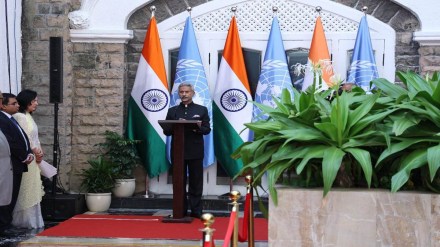Starting today, India for the first time is hosting two-day anti-terrorism meeting of the United Nations Security Council (UNSC). Day one of the meeting of the Counter-Terrorism Committee (CTC) is going on in Mumbai and the theme this year, as reported by Financial Express Online is “Countering the use of new and emerging technologies for terrorist purposes.”
On Day 1, in his inaugural address in Mumbai, external affairs minister Dr S Jaishankar has appealed to all nations to rise above all political difference to fight against the scourge of terrorism.
Because of political considerations, he said that the UN has regrettably been unable to act in some cases, and “this undermines our collective credibility and our collective interests.” Expressing his displeasure on some key planners and conspirators of 26/11 continuing to remain protected and unpunished, he stated that the attack was not only on Mumbai but was an attack on the International Community.
While terrorism plagues several regions, India understands its costs more than others, the minister said, adding the International community will never give up on holding terrorists accountable and holding justice.
In his address he also presented a five point agenda for the consideration of the CTC; these include: firstly, normative efforts at the UN need to be coordinated through collaboration with other international forums like the Egmont Group and Financial Action Task Force (FATF).
Secondly, he also expressed the need to ensure the transparent and effective functioning of the UNSC sanctions regime, and to ensure objective and evidence based proposals for listing terrorist groups, should not be rendered ineffective for political reasons. Especially those that curb their access to financial resources must be seen through, the minister said.
Thirdly, there should be international cooperation and concerted action against terrorists and their sponsors. This includes the dismantling of the sanctuaries, training grounds, safe havens, and also financial and ideological and most importantly the political support structures.
Also Read: India to host UN counter-terrorism meet for first time, focus on threat from emerging tech
Fourthly, he urged all countries to recognise linkages between terrorism and transnational organized crime and to strengthen multilateral efforts to break them.
Lastly the minister asked all the countries to share innovative solutions to stop the usage of virtual currencies for fundraising and finances by terrorist groups.
In his address President of the UN Security Council, Michael Moussa highlighted the growing use of crypto currency & Social Media by terrorists. According to him the response should be adept on the use of new technology by terrorists. He also appealed to the countries to prevent recruitment by terrorists.
Expert View: Terrorism targets onlookers rather than real victims
Sharing his view with Financial Express Online, Dr (Prof) Nishikant Ojha, eminent expert – West Asia and Middle East, “Terrorist groups use the Internet and technology more broadly for a range of reasons, such as: Propaganda, Cyber attacks, Fundraising, Recruitment and mobilization, Data Mining, information gathering, Psychological warfare, Software distribution(Secure communications), Surveillance, Training and many Terrorism activity.”
According to him, “Expanding technology capabilities that may be utilised as more deadly weapons is of growing interest to terrorists. Guns and explosives, including truck, automobile, and suicide bombings, may be common conventional weapons in a terrorist’s armoury.”
“We must never forget the Pulwama Attack in 2019,Uri Attack in 2016,26/11 Mumbai attack in 2008, Parliament attack in 2001, Bombay blasts in 1993attacks because those who forget history, often allow it to repeat,” he adds.
What about Drones & AI?
However, “Technology like drones, which are accessible, affordable, and capable of granting anonymity, is growing in popularity.
AI has many potential uses for terrorists, including mapping social networks and automating assaults, cyber attacks and digital disinformation campaigns and can target vulnerable youth in many new ways,” says Dr Nishikant, Cyber Terrorism & National Securities Issues expert.
In his opinion “The metaverse is a virtual reality world characterised by a three-dimensional, multi-sensory experience. For terrorists it can build their expanding arsenal.”
Use of crypto currency for terror funding
“Increasing adoption of crypto’s interest creates the potential for money laundering and tax evasion could be making life easier for terrorist groups. Groups like ISIS, Jaish-e-Mohammed, Lashkar-e-Taiba, Hizb-ul-Mujahideen (HM) and Harkat-ul-Jihad-al Islami Bangladesh (HuJI-B), Popular Front of India (PFI). The organisation’s public agenda focuses on mainstream questions of Muslim rights and PFI has raised substantial funds to organise terrorist training camps and is involved in raising terror funds by the sale and purchase of Crypto currency,” according to Dr Nishikant who is also associated in the field of advisory capacity to paramilitary, Defense and Law Enforcement Agencies.
According to him the sale of crypto currency allegedly takes place from Pakistan, transferred to multiple accounts in the Middle East, so the origin cannot be traced when it reaches India.
“Total transaction volume grew to $15.8 trillion in 2021, up 567 percent from 2020’s totals,” he adds.
